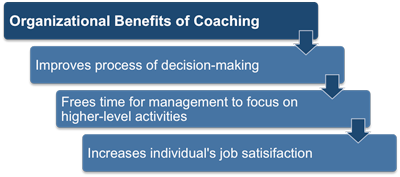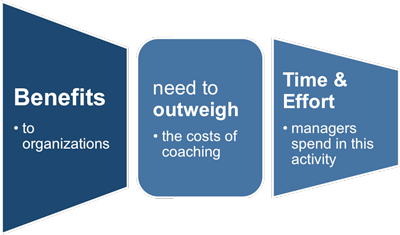Coaching Management Style
Coaching can be used in many areas of life; it includes life coaching, sports coaching, health coaching, financial coaching, and career coaching. Our Coaching Principles eBook is concerned with how the principles of coaching are used in management.
From a management perspective, coaching can be approached as either a discrete activity or as a management style. In other words, it can be done in designated 'coaching sessions,' which the manager and the team member recognize as such, or it can be integrated into the day-to-day management of a team or department.
 |
In either case, the objective is to encourage people to solve problems for themselves rather than referring them back up to their manager. In fact, managers who coach tend to place a lot of emphasis on developing the people reporting to them, and on creating an environment where people can perform as independently as possible.
So how do you define coaching? There is no universally accepted definition of coaching, but if you look at the definition used by the Association for Coaching® (AC) it states that coaching is:
'A collaborative, solution focused, result-orientated and systematic process in which the coach facilitates the enhancement of work performance, life experience, self-directed learning and person growth of the coachee' (Association for Coaching 2005).
This statement supports the AC's main purpose of wanting 'to inspire and champion coaching excellence' in individuals and organizations. For a more concise definition you can look at those supplied by Sir John Whitmore, a well-known exponent of business coaching, and Myles Downey, the author of Effective Coaching: Lessons from the Coach's Coach. For them, coaching is:
'Unlocking a person's potential to maximize their own performance. It is helping them to learn rather than teaching them' (Whitmore 2002).
'The art of facilitating the performance, learning and development of another' (Downey 2003).
The sentiments of these two definitions form the foundations of why senior management within organizations willingly spend time and money on maximizing the contribution and productivity of their employees.
Eric Parsloe, author of The Manager as Coach and Mentor and founder of The OCM (Oxford School of Coaching and Mentoring), takes the definition of coaching further by describing the qualities of a successful coach:
'[Coaching is a] process that enables learning and development to occur and thus performance to improve. To be a successful a Coach requires a knowledge and understanding of process as well as the variety of styles, skills and techniques that are appropriate to the context in which the coaching takes place" (Parsloe 1999)
A common theme for all these definitions is their focus on the individual and how improving their skills and knowledge helps them to perform more efficiently. This aspect of 'improving skills' is key to coaching because the learning of a new skill has a specific goal and occurs over a certain time period.
The end results of coaching benefit organizations because they improve the speed of decision-making, free up management time for higher-level activities, and increase job satisfaction among team members. Whilst all of these things are obviously desirable, coaching has associated costs that must be justified.
 |
For commercial organizations, the question is whether that cost can be justified in terms of improved profitability. In the case of non-profit organizations, the question is whether the cost can be justified in terms of improved service, or whether the time and effort be better spent elsewhere.
The answer to these questions will depend on many things, but the fact is that commercial organizations are moving from an era in which value lay in plant and machinery into one where it is increasingly found in ideas, imagination, knowledge, and customer satisfaction.
Similarly, many non-profit organizations can no longer take their funding for granted. Governments and other financial contributors are increasingly looking for value for money and for more to be done with fewer resources. As a result organizations are seeking ways to make their existing resources more productive, and coaching is seen as one of the ways they can achieve this.
As a manager you need to ensure that your coaching skills are effective and efficient so that the benefits you bring to your team maximize their productivity. Your role is to demonstrate to your seniors that the benefits attained from coaching your team members significantly outweigh the costs in terms of the time and effort you need to put in. The complexity of such a task will depend on how many people you have working for you and their coaching needs.
 |
To summarize, coaching can improve productivity, morale, and job satisfaction and make team members less dependent on you to solve their problems. Whilst you may be able to cope with everyone on your team taking up 15 minutes of your time each day, this is only sustainable with a relatively small team. Coaching can help you to disengage from the 'doing' part of the job and concentrate on the 'management' part.
This will give you more time to manage strategically, rather than becoming bogged down in day-to-day operational tasks, which is essential if you want to be promoted to senior management. In addition, the effects of coaching can make your job less stressful as your team become less dependent on you. This becomes more important the further you progress in your management career and the more people you have reporting to you.
You may also be interested in:
Management Coaching Skills | Differences Between Coaching and Training | Differences Between Coaching and Mentoring | Internal and External Coaches - Advantages and Disadvantages | Formal and Informal Coaching | Coaching Skills for Managers | Successful Coaching Skills.



